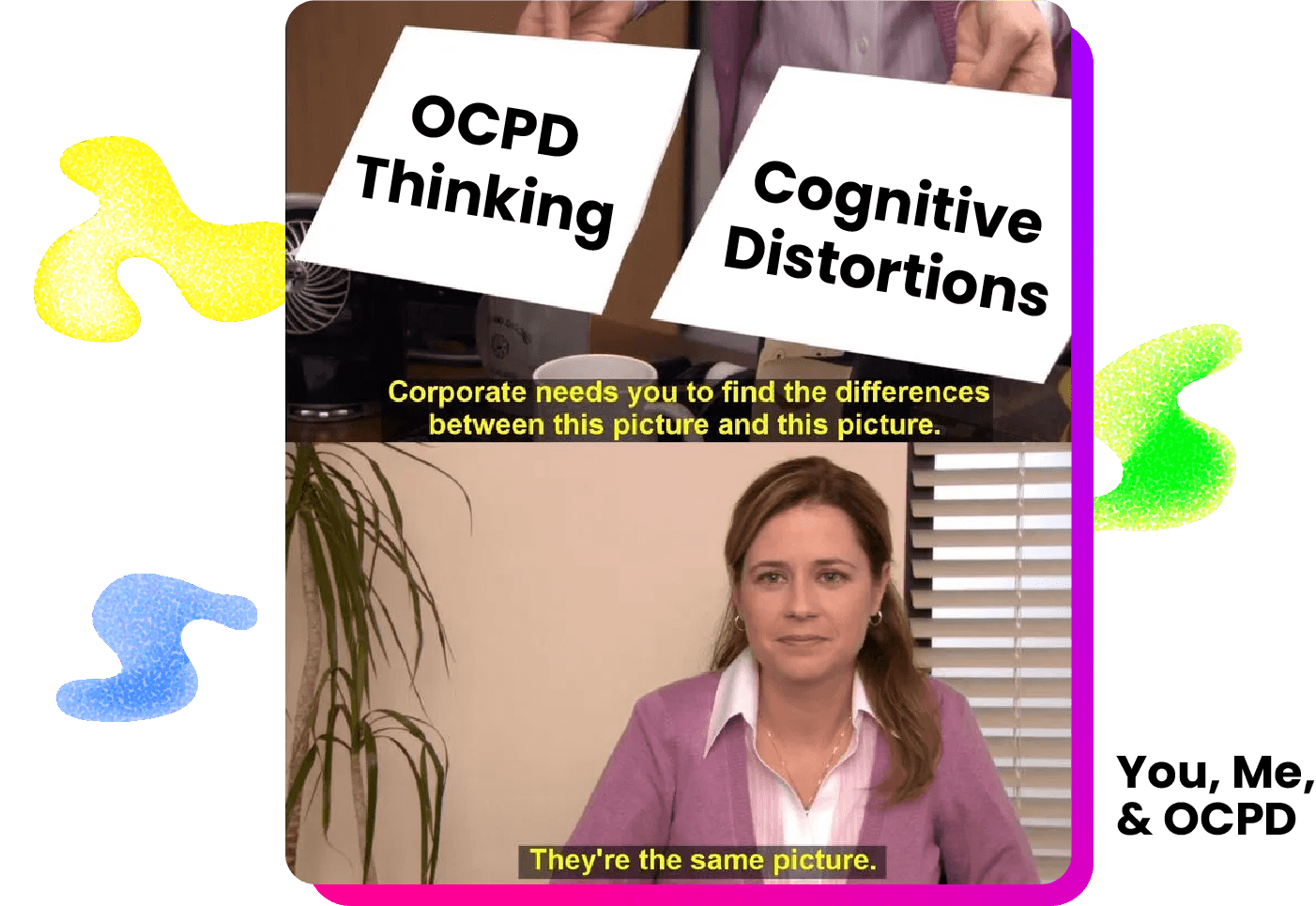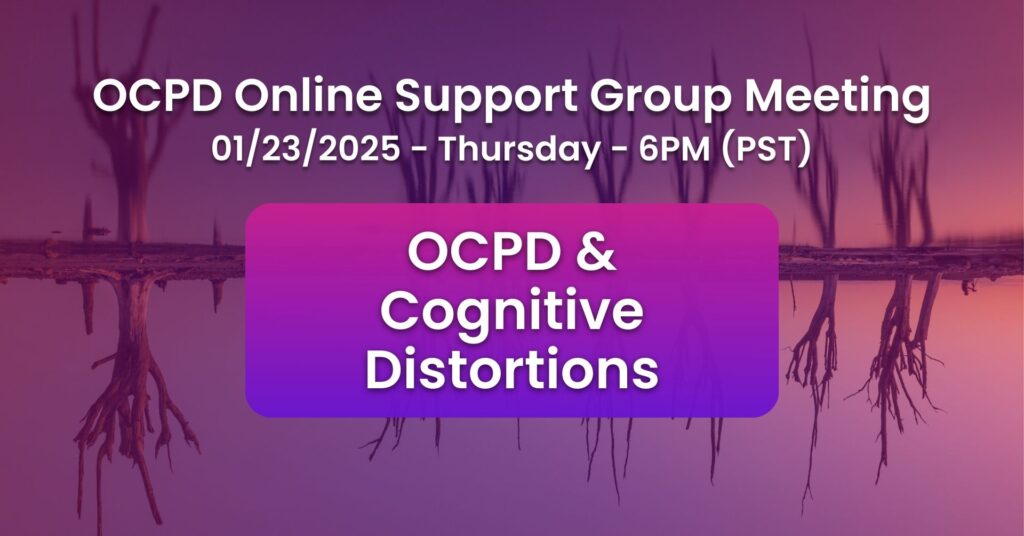The first thing that popped into my head as I was reading through a few lists of Cognitive Distortions for our discussion was this meme! 😅

But honestly, it became immediately apparent how I regularly engage in and wrestle with this distortions on a daily basis. I’m curious to see if there are naturally more prevalent, possibly over-represented, distortions in the OCPD population or if we have just as much diversity as the general public.
Cognitive Distortions: 22 Examples & Worksheets (& PDF)
by Courtney E. Ackerman, MA for PositivePsychology.com
Our brains are wired to alert us to danger, attract potential mates, and find solutions to everyday problems.
However, there are times when we may need to second guess our brain’s messages.
Our brains are predisposed to making connections between thoughts, ideas, actions, and consequences, whether they are truly connected or not.
This tendency to make connections where there is no true relationship is the basis of a common problem in interpreting research: the assumption that because two variables are correlated, one causes or leads to the other.
This is known as “cognitive distortions” in social science research, which can lead to false or overly simplistic assumptions. Let’s investigate these in more depth.
What are Cognitive Distortions?
Cognitive distortions are biased perspectives we take on ourselves and the world around us. They are irrational thoughts and beliefs that we unknowingly reinforce over time.
These patterns and systems of thought are often subtle–it’s difficult to recognize them when they are a regular feature of your day-to-day thoughts. That is why they can be so damaging since it’s hard to change what you don’t recognize as something that needs to change!
Cognitive distortions come in many forms (which we’ll cover later in this piece), but they all have some things in common.
All cognitive distortions are:
- Tendencies or patterns of thinking or believing;
- That are false or inaccurate;
- And have the potential to cause psychological damage.
It can be scary to admit that you may fall prey to distorted thinking. You might be thinking, “There’s no way I am holding on to any blatantly false beliefs!” While most people don’t suffer in their daily lives from these kinds of cognitive distortions, it seems that no one can completely escape these distortions.
If you’re human, you have likely fallen for a few of the numerous cognitive distortions at one time or another. The difference between those who occasionally stumble into a cognitive distortion and those who struggle with them on a more long-term basis is the ability to identify and modify or correct these faulty patterns of thinking.
As with many skills and abilities in life, some are far better at this than others–but with practice, you can improve your ability to recognize and respond to these distortions.
These distortions have been shown to relate positively to symptoms of depression, meaning that where cognitive distortions abound, symptoms of depression are likely to occur as well (Burns, Shaw, & Croker, 1987).
(Be sure to click the article link to read their list of cognitive distortions and examples)
Something else that stood out to me was how many different cognitive distortions there are and how they can overlap, feed into, and even reinforce one another. We could easily give each cognitive distortion its own session because there’s just so much relatable to explore. For the sake of facilitating our group discussion I’ve narrowed the following list to just 10 but feel free to search out for more extensive lists if you have the mental bandwidth.
As always, I want to remind and encourage everyone to extend a generous serving of self-compassion as we bring greater awareness to our thoughts, behaviors, beliefs, and emotions. The goal is to increase our awareness in the present moment so that we can gain access to healthier responses and implement them as we move forward in life.
Common Cognitive Distortions and Their Relation to OCPD (ChatGPT generated)
Here’s a list of 10 common cognitive distortions and their relationship to Obsessive-Compulsive Personality Disorder (OCPD):
- All-or-Nothing Thinking
- Viewing situations in absolute terms, such as “perfect” or “failure.”
- Relation to OCPD: Individuals may strive for perfection, believing anything less is unacceptable, leading to frustration or procrastination.
- Overgeneralization
- Making broad conclusions based on a single event or limited evidence.
- Relation to OCPD: A minor mistake might be seen as proof of incompetence, reinforcing the need for excessive control.
- Mental Filtering
- Focusing exclusively on negative aspects while ignoring positives.
- Relation to OCPD: Individuals may dwell on minor flaws, disregarding significant achievements, fueling perfectionism.
- Discounting the Positive
- Rejecting positive experiences by insisting they “don’t count.”
- Relation to OCPD: Positive feedback is often dismissed as insufficient, perpetuating self-criticism and overwork.
- Catastrophizing
- Expecting the worst-case scenario to occur.
- Relation to OCPD: Fear of mistakes or loss of control may lead to belief in catastrophic outcomes, driving compulsive behaviors.
- Should Statements
- Using “should,” “must,” or “ought” to impose rigid expectations.
- Relation to OCPD: Strict standards are imposed on oneself and others, causing frustration and interpersonal conflict when unmet.
- Personalization
- Taking excessive responsibility for external events or outcomes.
- Relation to OCPD: Individuals may feel personally responsible for team failures, even when circumstances are beyond their control.
- Magnification and Minimization
- Exaggerating mistakes or minimizing successes.
- Relation to OCPD: Mistakes are blown out of proportion, while achievements are undervalued, reinforcing perfectionism.
- Emotional Reasoning
- Believing emotions reflect objective truth.
- Relation to OCPD: Feelings of inadequacy may be interpreted as evidence of actual incompetence, driving rigid behaviors.
- Labeling
- Assigning global labels to oneself or others based on specific behaviors.
- Relation to OCPD: Individuals may label themselves as “a failure” after small mistakes or others as “irresponsible” for not meeting high standards.
Reflection Questions (ChatGPT generated)
Here are some helpful reflection questions for identifying and challenging cognitive distortions:
- Awareness:
- What specific thought or belief is making me feel this way?
- Is this thought based on facts, or is it an assumption or interpretation?
- How often do I think like this in similar situations?
- Perspective:
- What evidence supports this thought?
- What evidence contradicts this thought?
- Am I considering the whole picture, or am I focusing only on certain details?
- Alternative Thoughts:
- Is there another way to look at this situation?
- What would I say to a friend who had this thought?
- What is the most balanced and realistic way to view this situation?
- Emotional Reasoning:
- Am I basing this thought on how I feel rather than facts?
- Could my emotions be clouding my judgment?
- What would this situation look like if I felt calmer or more neutral?
- Catastrophizing:
- What is the worst thing that could realistically happen?
- How likely is that outcome, and what could I do to cope if it occurred?
- What is the best thing that could happen?
- What is the most likely outcome?
- Perfectionism and Standards:
- Am I setting unrealistic standards for myself or others?
- What would “good enough” look like in this situation?
- What happens if things don’t turn out perfectly?
- All-or-Nothing Thinking:
- Am I viewing this as entirely good or bad, with no middle ground?
- What are some shades of gray I could consider here?
- Can I identify any partial successes or positives in this situation?
- Labeling and Self-Criticism:
- Am I labeling myself or others unfairly based on a single instance?
- Is this label accurate, or am I ignoring other evidence?
- What are some qualities or strengths I am overlooking?
- “Should” and “Must” Statements:
- Am I using rigid language like “should,” “must,” or “always”?
- What would happen if I replaced these words with “could” or “might”?
- Are these expectations reasonable and flexible?
- Future-Focused Reflection:
- How will I feel about this situation a week, month, or year from now?
- What small step can I take to address this thought or belief today?
- How would acting differently in response to this thought improve my well-being?

![[Zoom Meeting] OCPD & Disgust 🤢](https://www.youmeandocpd.com/wp-content/uploads/2023/12/2023-12-14-OCPD-Disgust-1024x536.jpg)
![[Zoom Meeting] Reflecting on the Year 2023 📝🔍](https://www.youmeandocpd.com/wp-content/uploads/2023/12/2023-12-28-OCPD-Reflecting-on-the-Year-1024x536.jpg)